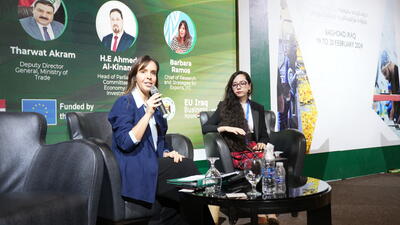

Small businesses with connections, financial records, hiring processes more likely to survive and grow in fragile contexts: UN report
Ahead of the second anniversary of the war in Ukraine, on 24 February, the latest flagship report of the International Trade Centre highlights actions by – and for – small businesses to blunt the impact of conflict on a country’s economy and stability.
(Geneva) – In the context of the ongoing conflict in the Middle East and war in Ukraine, the flagship report of the International Trade Centre (ITC), SME Competitiveness Outlook, reveals the key role of small businesses in bringing stability to fragile, conflict-affected contexts.
Small businesses make up 90% of all businesses in fragile settings – and when they survive, they provide many of the jobs, goods and services needed to meet basic societal needs.
Competitiveness as a coping mechanism
The new report, Small Businesses in Fragility: From Survival to Growth, shows that businesses can prioritize three actions to survive and grow: stay connected with institutions, buyers and other businesses; improve financial management; and identify and retain skilled staff.
The report by the UN small business agency, featuring findings from surveys conducted in Burkina Faso, Colombia, Honduras, Iraq, Kenya, Myanmar, South Sudan and Ukraine, reveals:
- 35% of small businesses that worked with business support organizations hired employees – which is a measurement of growth – versus just 14% of small businesses that grew without such connections.
- Companies that kept records of all business and financial transactions were twice as likely to report employee growth versus those that did not.
- 41% of companies with an established hiring process continued to hire even in fragile contexts, versus 31% of businesses that did so without these practices. Those employees were also more likely to have the right set of skills, making them more efficient at adapting operations in periods of instability.
Beyond survival, when set on a growth trajectory, small businesses are more likely to help sustain long-term stability and security of a country.
Firms’ growth in fragile contexts matters
The ability of companies to grow even in fragile contexts matters, as the world is becoming more fragile: 86% of the world’s poor could be living in fragile states by 2030.
One person out of every eight currently lives in a fragile situation, and that number includes most of the world’s poorest.
Though most businesses are hard hit by fragility, the impact hits small firms, informal businesses, women and young people hardest. For example, 34% of small businesses report experiencing high levels of fragility, compared to 18% of large firms.
Bottom up, top down approach
Helping firms cope with fragility is not enough. The report finds that under extreme violence, competitiveness ceases to protect firms – and can even expose them to threats such as violence and extortion.
A two-pronged approach can help address the root causes of fragility, one in which both small businesses and governments have critical roles to play. Governments can ensure enterprises have access to the hard and soft infrastructure they need to continue operations, reduce paperwork and simplify processes, and promote clear and consistent rules and modes of operating. Small businesses can learn to adapt to changing circumstances, forge deeper relationships with partners, and develop new ways of operating.
Watch the report launch live from Baghdad, Iraq, as part of the Iraq National Trade Forum, on 19 February at 9:45-10:45 CET / 11:45-12:45 AST, here.
Notes for the Editor
About ITC - The International Trade Centre is the joint agency of the World Trade Organization and the United Nations. ITC assists small and medium-sized enterprises in developing and transition economies to become more competitive in global markets, thereby contributing to sustainable economic development within the frameworks of the Aid-for-Trade agenda and the United Nations’ Sustainable Development Goals.
For more information, visit www.intracen.org.
Follow ITC on X | Facebook | LinkedIn | Instagram | Flickr
About the SME Competitiveness Outlook - The SME Competitiveness Outlook is ITC's flagship report, published annually since 2015. Each report provides an in-depth analysis on a particular topic related to the competitiveness of small and medium-sized enterprises (SMEs) – from their contribution to inclusive growth to their participation in regional value chains. The reports combine data analysis, academic insights, thought leader opinions, and case studies to provide guidance for policymakers, business managers, and trade and investment support institutions. For more information, visit the SME Competitiveness Outlook webpage.
Media contact
Susanna Pak
Senior Strategic Communications Officer
International Trade Centre
E: pak [at] intracen.org (pak[at]intracen[dot]org)




